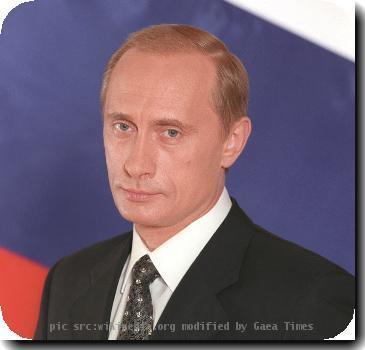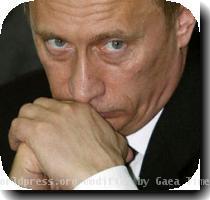Vladimir Putin says he will think about reclaiming Russian presidency in 2012
By Vladimir Isachenkov, APThursday, December 3, 2009
Putin: Will consider running for president in 2012
MOSCOW — In an electric four-hour solo performance on live television, Prime Minister Vladimir Putin said he will think about whether to reclaim the presidency — one of the strongest signals yet that he may run again for Russia’s top office in 2012.
Putin, who also vowed that Russia would step up its efforts against terrorism, spoke during a question-and-answer show on television and radio that highlighted his dominance of Russia’s political scene.
“I will think about it, there is still enough time,” Putin said when asked whether he will run in the next election.
“Don’t hold your breath,” Putin told another person who asked whether he was planning to leave politics.
Putin added he wants to focus now on his job as premier and make sometimes unpopular decisions without having to take electoral considerations into account.
Putin had to shift into the premier’s seat in 2008 following two consecutive terms in office, but since then the presidential term has been extended to six years and Putin is eligible to run again in 2012.
Some 2 million questions were submitted by telephone or on the Internet to Putin’s marathon television show, which was similar to previous call-ins he did when he was president. It clearly demonstrated that he continued to call the shots, overshadowing his designated successor, President Dmitry Medvedev.
Analysts said no one could miss Putin’s desire to reclaim the presidency.
“While he coyly said it’s too early for a decision, it certainly looked like he has already decided” to return to the presidency in 2012, said Nikolai Petrov of the Carnegie Endowment’s Moscow office.
“He’s too much of a professional to unveil his actual plans in such a format. But he did not reject the idea of returning to the presidency, and — unlike in previous comments — he made no mention of Medvedev,” Petrov told The Associated Press.
Olga Kryshtanovskaya, a sociologist who studies the Russian political elite, said Putin had decided to run again even before he stepped down.
“I think it was decided in 2007, when strategy was being planned,” she told the AP. “I think it was decided that Putin should not seek a third consecutive term, but that after four years he could return to the presidency.”
The bookish Medvedev, who has never made a similar TV appearance since his March 2008 election, was in Italy on Thursday to meet with the Italian leaders and the pope.
“If Putin doesn’t rule out running, neither do I rule myself out” for 2012 election, Medvedev told journalists in Rome when asked about Putin’s remarks.
Medvedev also said that he and Putin will act as “responsible politicians” and reach an agreement on the 2012 elections to avoid “elbowing one another” — echoing comments made previously by Putin.
Asked about his relationship with Medvedev, Putin said their common educational background and views allowed them to “efficiently work together.”
Putin, who has cast himself as a paternal figure protecting people from terrorism and economic upheavals, said Thursday that the threat of terrorism remains “very high” following a deadly train bombing that killed 26 people last week. He promised that authorities would act “very harshly” to root out militants.
“We have done a lot to break the spine of terrorism, but the threat is still here,” Putin said. “The entire society, all of us must be aware of that threat.”
The bombing last Friday of the Moscow-to-St.Petersburg express train fueled fears that Russia could face another wave of terror attacks. It was the first deadly terrorist strike outside the North Caucasus since the bombings of two airliners and a Moscow subway station attack in 2004.
Putin also focused heavily on economy during Thursday’s show, which featured televised links with workers from several industrial towns.
Putin said Russia has “overcome the peak of the crisis” and claimed credit for softening its impact. He added the government will have to spend more money to support the economy in the meantime.
Russia is weathering its worst economic downturn in a decade as commodities prices — the backbone of its economy — collapsed late last year. But it emerged from the recession in the third quarter, its GDP rising by a seasonally adjusted 0.6 percent.
Putin used the show to further burnish his common-man appeal, chastising the Russian rich for arrogantly showing off their wealth, saying their fancy imported cars looked as grotesque as golden teeth.
He congratulated a 55-year-old caller on her birthday and promised to send computers to a provincial school in reply to a student’s plea. He promised more compensation to a widow whose husband was among 75 people killed in a disastrous accident at Russia’s largest hydroelectric plant, and offered wage hikes and more social benefits to others.
“If the situation demands it, I will come to you or to any other place in the Russian Federation, it’s my duty,” he said.
In a careful balancing act in response to a question about Josef Stalin, Putin credited the Soviet dictator for his industrialization drive and World War II victory but denounced the massive repressions under Stalin’s regime.
Putin angrily accused former billionaire oil tycoon Mikhail Khodorkovsky and other top shareholders in the Yukos oil company of ordering the killings of opponents and commercial rivals.
Khodorkovsky, once Russia’s richest man, is serving an eight-year sentence on fraud and tax evasion charges widely seen as a punishment for challenging Putin. Authorities long have alleged that Khodorkovsky and other top Yukos officials were involved in murders but failed to prove the claims.
Delving into foreign policy issues, Putin sharply admonishing the United States for keeping “anachronistic” Cold War-era trade restrictions imposed to penalize the Soviet Union for its refusal to allow free emigration of the Jews.
“The Soviet Union is gone, but they (restrictions) have remained,” he said.
Putin also accused the United States of hampering Russia’s accession into the World Trade Organization.
“Accession into the WTO remains our strategic goal, but some nations, including the United States, are impeding Russia’s WTO bid,” he said.
____
Associated Press writers Steve Gutterman and Nataliya Vasilyeva in Moscow and Frances D’Emilio in Rome contributed to this report.
Tags: Eastern Europe, Europe, International Trade, Italy, Moscow, North America, Rome, Russia, Terrorism, United States, Vladimir Putin, Western Europe

